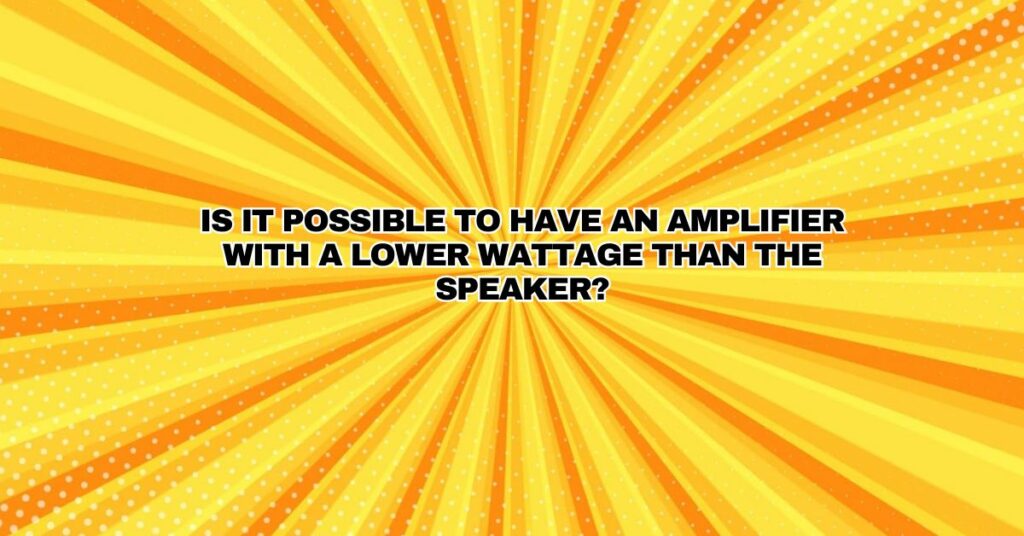In the world of audio equipment, the concept of matching amplifiers to speakers is a crucial consideration, and one question that often arises is whether it’s possible to use an amplifier with lower wattage than the speaker. In this comprehensive article, we will explore this scenario, understand its implications, and discuss the circumstances in which it may be feasible to use an amplifier with less power than the speaker.
Understanding Amplifier and Speaker Power Ratings:
Before we dive into the discussion, let’s clarify some key terms and concepts:
- Amplifier Power (Wattage): This refers to the electrical power output of an amplifier, typically measured in watts (W). It represents the amount of power an amplifier can deliver to drive connected speakers and produce sound.
- Speaker Power Handling: This specification indicates the maximum electrical power, also measured in watts, that a speaker can handle without risking damage. It is a critical factor that demonstrates a speaker’s durability and its ability to withstand the power delivered by the amplifier.
Is It Possible to Use an Amplifier with Lower Wattage Than the Speaker?
The short answer is yes, it is possible to use an amplifier with lower wattage than the speaker, but several factors need to be considered:
The Role of Sensitivity:
A crucial factor that can make this scenario work is speaker sensitivity. Sensitivity is a measurement of how efficiently a speaker converts electrical power into sound. It is usually measured in decibels (dB) and represents the volume level achieved when an amplifier delivers one watt of power to the speaker at a specific distance.
- High Sensitivity Speakers: If you have high sensitivity speakers, they can produce a high sound level with relatively low amplifier power. In this case, you can use an amplifier with lower wattage.
- Low Sensitivity Speakers: On the other hand, if your speakers have low sensitivity, they require more amplifier power to reach the same volume. Using an amplifier with lower wattage in this situation may result in insufficient volume levels.
Application Matters:
The feasibility of using an amplifier with lower wattage than the speaker depends on the intended application:
- Home Listening: In a home listening environment, where high volume levels may not be a priority, using an amplifier with lower wattage can be suitable, especially if you have high sensitivity speakers.
- Professional or Live Sound: In professional audio settings, live sound, or venues that require high volume levels, it’s generally advisable to match the amplifier’s power more closely to the speaker’s power handling capacity to ensure adequate volume and avoid potential distortion.
Cautions and Considerations:
While it is possible to use an amplifier with lower wattage than the speaker, some cautions and considerations apply:
- Monitor Volume Levels: Keep an ear on the volume levels and avoid pushing the system to its limits. Using an amplifier with lower wattage means that there’s less headroom before distortion occurs.
- Consider Speaker Sensitivity: If you have low sensitivity speakers, using an amplifier with lower wattage may not provide adequate volume levels, even in a home listening environment.
- Musical Genres: The type of music you listen to matters. Dynamic music with wide volume variations may not be as well-suited to this setup, as it could result in clipping and distortion during loud passages.
- Speaker Health: Prolonged operation at high volumes with an underpowered amplifier can potentially damage the speakers, even if sensitivity is high. Careful monitoring of volume levels is crucial.
Conclusion: The Power Balance Between Amplifiers and Speakers
While it’s possible to use an amplifier with lower wattage than the speaker, the decision should be made carefully, taking into account speaker sensitivity, intended application, and the type of music you listen to. In some situations, such as home listening with high sensitivity speakers, this setup can be practical. However, in scenarios where higher volume levels are essential, a closer match between the amplifier’s power and the speaker’s handling capacity is advisable to ensure optimal performance and protect your audio equipment. Careful volume monitoring is key to achieving the best balance between amplifiers and speakers while maintaining sound quality and system health.


